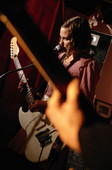
FRIDAY, June 11 (HealthDay News) — Training performers to use biofeedback techniques to control their stage fright can dramatically reduce anxiety while improving overall performance, new research indicates.
The finding suggests that artists may have another weapon in their arsenal — besides traditional interventions, such as prescription beta blockers and aerobic exercise — to combat the potentially crippling effects of this condition.
Reported in the spring issue of Biofeedback, the current investigation into stage fright treatment was led by Myron R. Thurber of Neurotherapy Northwest in Spokane Valley, Wash., in collaboration with scientists from the University of North Texas in Denton, Texas.
The authors noted in a news release from the publisher that more than 70 percent of musicians may suffer from a severe form of high anxiety stage fright called “musical performance anxiety.”
Thurber and his associates assessed a group of university-student musicians while performing in front of an audience.
Afterwards, the participants engaged in four 30- to 50-minute educational sessions to learn how to control their heart rhythm while focusing their thoughts and emotions. An inexpensive biofeedback device enabled them to monitor their progress.
Biofeedback aims to improve emotional stability, efficiency and clarity by training users to exert a calming influence over the neuronal and hormonal communication process that is constantly under way between the brain and the heart.
Following training, all the musicians performed again. The research team found that performance anxiety levels dropped 71 percent, while overall performance improved by 62 percent.
What’s more, the musicians said they were able to apply their newly acquired biofeedback skills to other aspects of their lives to reduce stress, increase calmness, improve anger management, feel more relaxed and get better sleep.
More information
For more on biofeedback, visit the U.S. National Institutes of Health.

